The Friday night lesbian feature at the Castro was violent, implausible, silly, and yet strangely satisfying. It was a genre picture (shades of this festival’s theme) in search of a genre; not quite sure whether it was an action or horror flick, and stumbling over some of the details essential to gratuitous violence films, Continue reading
Category - Pulp
Three Barbaras
So I recently finished Indomitable: The Life of Barbara Grier by Joanne Passet and at last I understand why those Naiad Press books ol’ Babs put out had that distinctive look. Barbara, it seems, was your classic lesbian cheapskate; she would do anything to maximize the number of books she could get in a box, and that included squishing more Continue reading
Sad Young Men Across the Pond
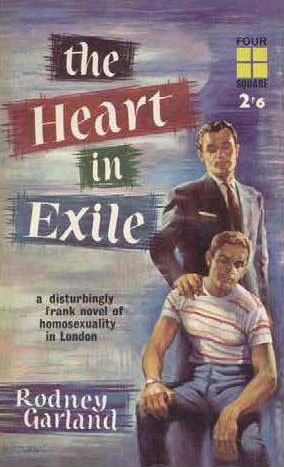 The Heart in Exile by Rodney Garland, W.H. Allen 1953
The Heart in Exile by Rodney Garland, W.H. Allen 1953
Cover line: A disturbingly frank novel of homosexuality in London
I discovered this gay British novel, not precisely a pulp but on the pulpy end of the spectrum, through a citation in my favorite book of 2015, The Spiv and The Architect. “Queer novels of the 1950s frequently exploited the continued currency of the traditional moral economy of furniture and design as a useful device for highlighting the domestic propriety of their respectable ‘homosexual’ protagonists,” wrote author Richard Hornsey, using The Heart in Exile as his example. He ties the novel’s detailed description of a bachelor flat to the way “a specter of malignant queerness haunted modern design,” leading to the perception of modern furniture as “an agent of corruption that would seduce children from the normative rituals of family life.” Who wouldn’t be intrigued?
The Plot: The suicide that ends many pulps starts this one. Tony Page, a queer, currently celibate psychiatrist takes on a new patient, Ann Hewitt. Continue reading
Just Plain Pulp
 Kate, by Chet Kinsey, Beacon, 1959
Kate, by Chet Kinsey, Beacon, 1959
Cover Line: “A novel that tells the truth about those homes for unwed mothers…”
Add this book to the category, “I’ve slogged through it so you don’t have to.” This is a perfect example of the mediocre stuff that was churned out solely to keep those drugstore bookracks filled. Did even Barbara Grier read this? I doubt it. Some friend said, Continue reading
The Man Who Would Be Lesbian
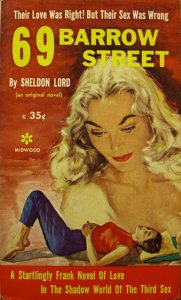 69 Barrow Street, by Lawrence Block writing as Sheldon Lord, Tower, 1959
69 Barrow Street, by Lawrence Block writing as Sheldon Lord, Tower, 1959
Cover Line: “Their Love was Right! But Their Sex Was Wrong!”
We’ve all known them: the men who long to be lesbians. in the days before they found an outlet for their frustrated desires by dominating the discussions in women studies classes with passionate paeans to Monique Wittig, they wrote lesbian pulp.
Does Lawrence Block belong to this esoteric tribe? One thing is for sure: before becoming Continue reading
Ozu’s Lesbian Kiss
There aren’t a lot of lesbian kisses on screen. Especially in the 1930s. In Japan. But this is one of the best. Continue reading
Journey to Ann Bannon
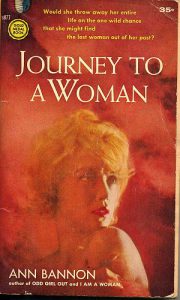 Journey to a Woman, by Ann Bannon, Fawcett Gold Medal, 1960
Journey to a Woman, by Ann Bannon, Fawcett Gold Medal, 1960
Classic Line: “All the dormant fires of her younger days had sprung to life and they burned in her still, tempting her, torturing her until she knew she would have to find release somewhere or die of it.”
It took me many years to appreciate Ann Bannon’s contribution to lesbian literature. Bannon wrote five pulps between 1957 and 1962, linked novels that tell the intertwined, melodramatic adventures of Laura, Beth, and Beebo. The books made her Continue reading
Sad Young Men of LA
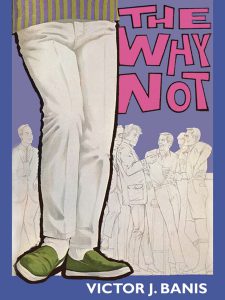 The Why Not, Victor Banis, A Greenleaf Classic, 1966
The Why Not, Victor Banis, A Greenleaf Classic, 1966
Best Line: “The Why Not represented everything he disliked about gay bars–screaming faggots, drag queens, rough trade. It was cheap and tawdry and, probably because of those qualities, successful.”
The above describes the book as well as the bar. I’ve been doing a little research on gay male pulp, in preparation for the upcoming pulp panel, and from what I’ve read The Why Not was the Women’s Barracks of the genre, a ground-breaking novel that led the way for books like Midtown Queen and Hot Pants Homo. Continue reading
Designing Lesbians
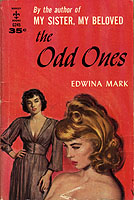 The Odd Ones, Edwina Mark, Berkley Books, 1959
The Odd Ones, Edwina Mark, Berkley Books, 1959
“Jean discovered her true sexual nature through the expert teachings of sleek Sherri Lancaster.”
The Plot: Orphaned outcast Jean Grant is so desperate to get out of her hick town and discover her “true nature” she elopes with sensitive Tim, the unhappy son of the lecherous druggist (who is also Jean’s employer). After gritting her teeth through their wedding night, Jean steals Tim’s $1000 nest egg and hightails it to New York. There she checks into a cheap hotel and sets out to explore the city, alternately racked by guilt and overflowing with delirious joy at her newfound freedom. Continue reading
Summer Camp
Novel writing and blogging don’t go together, at least not when you’re on a deadline. I emerged from my post-deadline sleep to discover that the notes from the pulp I’d been reading before it all started, Someone to Love, were mysteriously missing. Continue reading
